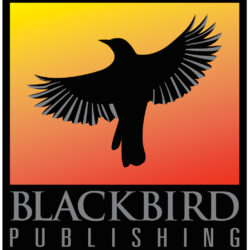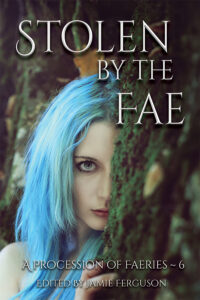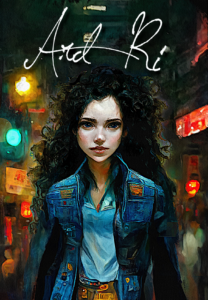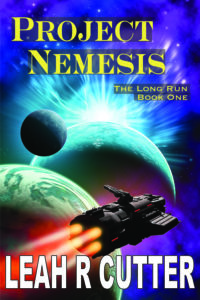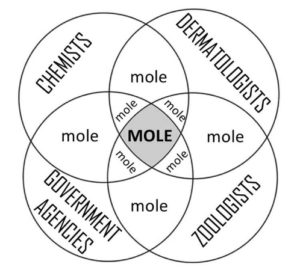“Estimated Value,” by DeAnna Knippling, appears in Stolen by the Fae, the 6th volume in the anthology series A Procession of Faeries.
The Interview
Why do you think the mythology of the changeling, in which the Fae steal a human and replace it with one of their own kind, is so intriguing to people?
I think the stories about changelings are generally intriguing for some dark reasons.
On the one hand, people have been looking for explanations about why their kids aren’t like them for a long, long time. We put a lot of our hopes, rather unfairly, on children, expecting them to be and do better than their own parents! The story of the changeling helps put words to those taboo feelings of “this wasn’t the baby I was promised.” The story also serves as a cautionary tale: if you don’t love and watch over your child, the fae will take them away, usually both the human child and (eventually) the fae one, which either dies or disappears, leaving the parents with nothing.
—And yet on the other hand, a lot of us have a sneaking suspicion that we don’t belong with our families of birth. We don’t fit in; we make each other uncomfortable; we are treated in ways that aren’t acceptable. I think a lot of stories about “secretly, the main character was adopted” touch on this, too.
Changeling stories hit a nerve about feeling like we don’t belong. Sometimes that nerve gets too ugly to talk about directly. Fortunately, we can tell stories to help release or process those feelings.
Is there a recurring theme that appears in your writing? If so, what is it, and why do you think it keeps appearing?
I write a lot about bullies and about systems that bully. I usually don’t set out to write about that theme; it just comes up. My story in Stolen by the Fae, “Estimated Value,” isn’t really about that theme, but about a new theme that’s been coming up lately, about faith.
Not religious faith, but believing that you have to do the right thing, whether you think it’s going to work or not. Never looking directly at one’s hopes, but following them out of the corner of your eye, as it were.
Is there a fairy tale that you really enjoy, or which has stuck with you? If so, which one—and what do you find compelling about this particular story?
Today the one that sticks in my mind is “The Seven Swans,” about the girl who has to be silent for six years while sewing shirts for her brothers, who have been changed into swans by a witch. While alone in the forest sewing her brothers’s shirts, the girl is claimed by a king and has two children by him, who are whisked away by the king’s mother. The mother pretends that the new queen has eaten the children; the new queen refuses to defend herself and keeps sewing.
Finally the shirts are almost done; the swans appear just as the new queen is about to be burned at the stake. She throws the shirts over her brothers, who change back into humans, and then defends herself against the evil mother.
I like the story, but it sticks with me for a couple of reasons:
–How did she choose between her brothers and her children?
–Why didn’t she find a way to cheat?
A lot of fairy tales feature protagonists who are clever, tricky enough to find a way around a problem instead of trying to stubborn their way through it. This story, though, is about pure, bloody-minded determination. The virtue of stubbornness and holding to one’s purpose, even when other people use it against you. I wouldn’t want to get on her bad side, though.
What aspect do you like most about your story in Stolen by the Fae, and why?
I’m used to writing darker stories where the characters have to give their all, whether they succeed or fail. For all that the main character is this direct, blunt kind of guy, he also has a subtle delicacy about him that I really liked. I feel like he was saying, “Follow your instincts, but follow them quietly, so you don’t get caught and stopped.”
What are you working on now, and what’s fun about what you’re writing?
I’m working on a massive drama/romance/spy thriller episodic series called Blind Date with Death. It’s about bullies and faith, I suppose. The really fun part is going, “I can’t write that!” and the characters going, “You wi-illll.” I feel like the characters are in charge, not me. Which is good; they’re smarter than I am.
While there aren’t any truly supernatural elements to the story, I’m working on a section now that’s full of girls who have become changelings or “lost girls” of a sort, separated from their birth families but refusing to return home again. They hoped to find a better life, or at least a less restrictive one, got sucked into a horrific system, and kind of feel like it would be pointless to go back. They no longer fit. I’m not sure how things will work out for them (I’m not plotting ahead of time), but they’re both poignant and a lot of fun to write about.
About DeAnna
DeAnna Knippling is always tempted to lie on her bios. Her favorite musician is Tom Waits, and her favorite author is Lewis Carroll. Her favorite monster is zombies. Her life goal is to remake her house in the image of the House on the Rock, or at least Ripley’s Believe It Or Not. You should buy her books. She promises that she’ll use the money wisely on bookshelves and secret doors. She lives in Florida and is the author of The House Without a Summer: A Gothic Novel, and other books like The Clockwork Alice, A Murder of Crows: Seventeen Tales of Monsters & the Macabre, and more.
Find DeAnna
Website ~ Facebook ~ Twitter ~ Instagram ~ Pinterest ~ Goodreads ~ BookBub ~ Patreon
Find Stolen by the Fae
Universal Book Link ~ Amazon ~ Apple Books ~ Barnes & Noble ~ Kobo ~ BookBub ~ Goodreads
A Procession of Faeries
Learn more about the series, and follow A Procession of Faeries on Facebook and Goodreads!
